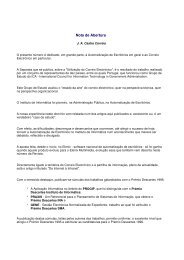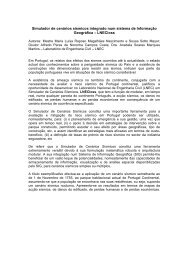OECD Peer Review of E-Government in Denmark - ePractice.eu
OECD Peer Review of E-Government in Denmark - ePractice.eu
OECD Peer Review of E-Government in Denmark - ePractice.eu
You also want an ePaper? Increase the reach of your titles
YUMPU automatically turns print PDFs into web optimized ePapers that Google loves.
CASE STUDY 1: STANDARDS-BASED E-GOVERNMENT IN THE HEALTH SECTOR<br />
Organisation <strong>of</strong> health care <strong>in</strong> <strong>Denmark</strong><br />
Approximately 85% <strong>of</strong> Danish health services are provided by public <strong>in</strong>stitutions. Wherever<br />
possible, services are provided at the level closest to their users. Management <strong>of</strong> the health sector is<br />
decentralised, with regional government provid<strong>in</strong>g the majority <strong>of</strong> services. Municipalities also<br />
provide health services and State government, through the M<strong>in</strong>istry <strong>of</strong> the Interior and Health, has an<br />
overarch<strong>in</strong>g role <strong>in</strong> national health policy and strategy. The health sector has adm<strong>in</strong>istrative bodies at<br />
the State, county and municipal levels.<br />
Strategic context<br />
National Health Sector IT strategy<br />
S<strong>in</strong>ce 1999, e-government <strong>in</strong> the Danish health sector has been guided by the National Strategy<br />
for IT <strong>in</strong> the Hospital Sector, which is now <strong>in</strong> its second iteration, cover<strong>in</strong>g the period 2003-2007. This<br />
strategy reflects the <strong>Government</strong>’s overarch<strong>in</strong>g view that effective use <strong>of</strong> modern ICT is crucial to<br />
both the quality <strong>of</strong> health services, and the ability <strong>of</strong> the health sector to contribute to overall goals<br />
relat<strong>in</strong>g to the susta<strong>in</strong>ability <strong>of</strong> the public sector.<br />
Co-operatively developed by the M<strong>in</strong>istry <strong>of</strong> Interior and Health, the National Board <strong>of</strong> Health,<br />
Danish Regions and Healthcare Copenhagen, the strategy encompasses the whole <strong>of</strong> the health sector.<br />
The aim is to create a common framework for full digitalisation <strong>of</strong> the health system. The strategy is<br />
designed to strengthen centralised co-ord<strong>in</strong>ation <strong>of</strong> health sector ICT while, at the same time, creat<strong>in</strong>g<br />
conditions for effective decentralised use <strong>of</strong> ICT by service deliverers (hospitals, local health bodies,<br />
general practitioners, etc.). A key goal <strong>of</strong> the strategy is to enable data shar<strong>in</strong>g between the many<br />
disparate ICT solutions that exist <strong>in</strong> the sector. Achiev<strong>in</strong>g this goal requires the widespread use <strong>of</strong><br />
electronic data networks and electronic health records (EHRs) based on common standards, which<br />
were due to be <strong>in</strong>troduced <strong>in</strong> all Danish hospitals by the end <strong>of</strong> 2005.<br />
Structural Reform<br />
The Structural Reform will impact significantly on the health sector. Through the Reform, the<br />
health aims to promote a strong public health service that <strong>of</strong>fers patients unrestricted, equal and free<br />
access to high-quality prevention, exam<strong>in</strong>ation, treatment and care services.<br />
The five new regions that will supersede the current counties will reta<strong>in</strong> significant responsibility<br />
for delivery <strong>of</strong> health services. Municipalities will play a stronger role <strong>in</strong> provision <strong>of</strong> those services<br />
that are not provided by hospitals. Regions and municipalities will be legally required to co-operate<br />
with one another; the grounds for this co-operation are established through obligatory regional health<br />
care agreements.<br />
At the State government level, the National Board <strong>of</strong> Health (part <strong>of</strong> the M<strong>in</strong>istry <strong>of</strong> Interior and<br />
Health) will act as co-ord<strong>in</strong>ator <strong>of</strong> the health system. Its responsibilities will <strong>in</strong>clude specify<strong>in</strong>g certa<strong>in</strong><br />
150
















